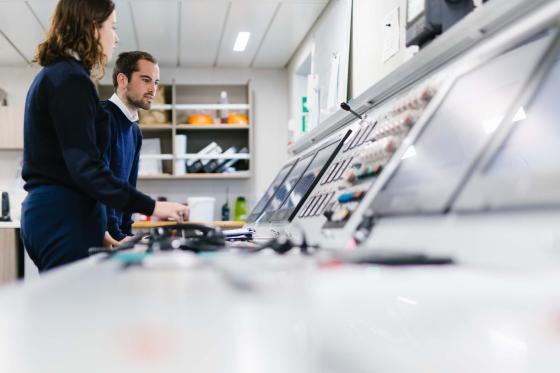Marine engineering
Forget what you think you know about engine rooms: everything on board is bigger and more complex. It is at once old-fashioned industrial and ultramodern and computer-controlled. As a marine engineer you run that entire factory on the water, without room for error. Your education therefore zooms in on thermal and pneumatic physics, but just as much on the computer science with which ocean ships are controlled from a distance. Because that's what the future looks like.

Marine engineering
The study
Marine engineers are responsible for the functioning of the ship as a machine: the propulsion and the engines, all measuring systems, the electricity and electrical engineering, the water purification, the production of steam and the purification of ballast water and the engine emissions. They learn how all these technical systems are interrelated and how they should function like a well-oiled machine. This is done not only through theoretical subjects, but also through extensive skills training throughout the course, in the workshop and on simulators. IMPORTANT! Note that our Bachelor and Master programmes Nautical Sciences and Marine Engineering are taught in Dutch or French, not in English. You'll need a language level B2 in either Dutch or French to study the full programme at Antwerp Maritime Academy.
All aspects of the ship – Engineers are responsible for the functioning of the ship as a machine: the propulsion and the engines, all measuring systems, the electricity and electrical engineering, the water treatment, the production of steam and the purification of ballast water and the engine emissions. Here you learn how all these technical systems are interrelated and how they should function as a well-oiled machine.
Dirty hands guaranteed – Of course you first get a thorough theoretical basis. This is essential if you want to be able to solve problems independently. But of course you also apply that knowledge during your studies. You can expect thorough skills training throughout the course, in the workshop and on simulators.
Innovation asset – You study not only the ships of yesterday, but also those of tomorrow. The important new technological innovations in the dredging and offshore world are crucial in your development. And you also learn how you can contribute to that innovation through research. Yep, that means a lot of math, physics and chemistry. Nothing you can't handle, right?
Safety first – Anyone who goes out on the water must be prepared for anything. And so you also immerse yourself in safety at sea, firefighting, dealing with environmental regulations on board, medical techniques, ... And because your crewmates will come from all corners of the world, large portions of maritime English and communication skills will not be superfluous.
Hour by hour
Feel like diving a little deeper into your class schedule now or preparing to start? You'll find much more information in the study guide. Feel free to get in touch if you have any questions.
Before you start
Decided to go for it? Welcome aboard (that's the last pun, promise). To ensure that the start goes smoothly, it is best to arrange these points in advance. Feel free to contact the student administration if you have any questions. We are very happy to help you
Medical examination
The students must undergo a medical examination, preferably before the start of the study, but certainly before the start of the internships on board. Students who are not medically fit to sail can do an internship as a student on board, but the internship is only recognized as sailing time (necessary for promotions) if they are medically fit to sail on graduation. The initial medical examination takes into account the candidate's potential for a full career; if a condition does not allow this, the student will be advised about this.
Uniform
Wearing a uniform at school is mandatory. The cost of a complete trousseau (uniform and supplies) is approximately 900 euros. Sometimes second-hand uniforms are offered on the bulletin boards. Students are not required to wear a uniform from the first day of school, but we expect them to do so by 3 November at the latest.
Mathematics bridging course
This course is intended as an entry-level course in mathematics for first-year students of the Maritime Academy (both for Nautical Sciences and Marine Engineering courses). The aim is to repeat a number of subjects from the mathematics curriculum of secondary education. The knowledge of the subject matter can be tested by means of exercises.

